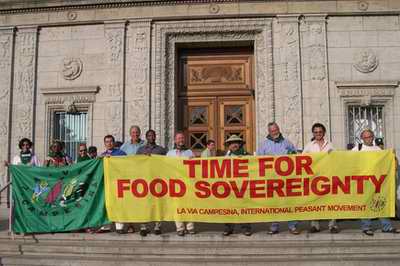“In Defense of the Family Farm”- with Elizabeth Mpofu at FoodShare
Posted: May 27, 2014
Categories: Food in the News / GoodFoodBites / News from Sustain Members / News from Sustain Ontario
 FoodShare Toronto, together with the Toronto Food Policy Council, recently organized an open discussion about food sovereignty and agroecology with the General Coordinator of La Via Campesina (LVC) and Chairperson of the Zimbabwe Smallholder Organic Farmers’ Forum, Elizabeth Mpofu. LVC is an international movement focused on uniting millions of agricultural workers, small and medium-sized farmers, peasants, landless people, women farmers, indigenous people and migrants from around the world. Ultimately, it is an organization committed to social justice by way of defending small-scale sustainable agriculture around the globe.
FoodShare Toronto, together with the Toronto Food Policy Council, recently organized an open discussion about food sovereignty and agroecology with the General Coordinator of La Via Campesina (LVC) and Chairperson of the Zimbabwe Smallholder Organic Farmers’ Forum, Elizabeth Mpofu. LVC is an international movement focused on uniting millions of agricultural workers, small and medium-sized farmers, peasants, landless people, women farmers, indigenous people and migrants from around the world. Ultimately, it is an organization committed to social justice by way of defending small-scale sustainable agriculture around the globe.
Mpofu gave some insight into what has led to the current land reform process in her homeland, Zimbabwe, and the issues that have been faced by many of her people. These issues, as she elaborated, stem from the historically inequitable distribution of land among disenfranchised black Zimbabweans. After much political and social unrest, over 400 European-owned commercial farms were occupied by native Zimbabweans– a decisive move to take back the land that was initially taken from them. Eventually, government sanctions lead to massive land redistribution programs resulting in the majority of farms still under European ownership being acquired and redistributed into 160,00 smaller farming units.
While this newly acquired land was a small victory, Mpofu also identified various challenges confronted by farmers and other similar interest groups. These challenges, include the effects of climate change (specifically, droughts and floods); use of harmful chemicals for food production; the introduction of genetically modified (GM) seeds by large, multinational corporations and GM food through food aid, and a lack of youth engagement.
The sum of these challenges has triggered mass mobilization. While there were a number of NGOs that lobbied on the farmers’ behalf, it was believed that their views did not always reflect the farmers’ interests. This is the responsibility that LVC had chosen to take over in order to establish greater food sovereignty in communities.
The concept of ‘food sovereignty’, coined and promoted by LVC, aims at ‘redefining the fundamental right to food to the advantage of food-producing peasants themselves’. Mpofu highlighted the importance of sustainable production practices like agroecology in achieving these goals. Agroecology is a whole-systems approach to agriculture that fosters ecologically, culturally, economically, and socially sustainable food and farming communities. Mpofu further explained that truly sustainable food systems must utilize local species (e.g. drought tolerant species); reintroduce indigenous farming practices; establish seed sovereignty; form alliances that are open to sharing knowledge; encourage youth involvement; and must be anchored by good food and farming policies that allow these practices to thrive.
The discussion then turned to Toronto and its path toward food–and seed–sovereignty. As a city in the global North, Toronto faces a different set of challenges than growers in Zimbabwe, but many of our goals are the same. Angela ElzingaCheng, FoodShare’s Urban Agriculture and Community Food Animation Manager, highlighted the work of the Toronto Seed Library, a community seed hub that enables and promotes seed saving practices city-wide. FoodShare has also been encouraging seed sovereignty through supporting “Seedy Saturdays” events–an initiative hosted by local organizations, including Seeds of Diversity–that provides a the meeting place for the sharing and distribution of seeds to the public. Many attendees also noted the need for collaboration between urban and rural dwellers, as well as supporting the work of First Nations communities in Canada in their struggle for food sovereignty.
At the end of the session, the participants, many of whom consisted of young people, were left with some inspiring messages from the speakers. Elizabeth encouraged the youth to band together and form a strong youth movement. She implored the youth to speak up more about the issues stating “we want to hear from you, not you from us”. Angela shared Elizabeth’s sentiments and further suggested that people should use their connection to food itself as a catalyst for further engagement–from “personal to political” and vice versa. Lauren Baker of the Toronto Food Policy Council, applauded the Toronto Youth Food Policy Council and the many creative and entrepreneurial projects that youth have started up in the city amidst widespread unemployment. While there is still much more to do, it seems the food movement in Toronto has a bright future.
Though facing dramatically different challenges, the event provided a unified vision for what the future of family farming could look like from Zimbabwe to Canada. We thank Elizabeth Mpofu for making the journey to our city and sharing her wisdom and experiences with us. It was a great pleasure hearing from all speakers and we look forward to further discussions in the future.
Co-Authored by: Toby Davine
